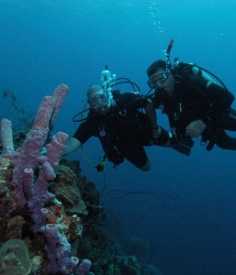Local researcher reveals need to educate divers
 (CNS): Although the beauty and intrigue of underwater communities is diving’s major draw divers can harm the very environment they seek to experience through unintentional collisions or deliberate touches. Research has found that a little pre-dive education goes a long way to mitigating the impact on delicate underwater habitats. “It’s important to have some conservation education immediately before entering the water to really remind people,” said Emma Camp, a conservation biologist at the Central Caribbean Marine Institute in the Cayman Islands. Camp had suspected for years that divers might impact the corals, but that this behaviour could be changed.
(CNS): Although the beauty and intrigue of underwater communities is diving’s major draw divers can harm the very environment they seek to experience through unintentional collisions or deliberate touches. Research has found that a little pre-dive education goes a long way to mitigating the impact on delicate underwater habitats. “It’s important to have some conservation education immediately before entering the water to really remind people,” said Emma Camp, a conservation biologist at the Central Caribbean Marine Institute in the Cayman Islands. Camp had suspected for years that divers might impact the corals, but that this behaviour could be changed.
Camp is now a resident scientist at the Little Cayman marine institute where she is currently working on her PHD. In an interview with Mission Blue she talks about the research she did before working at CCMI about educating divers about touching reefs while diving.
In her research she found that even the most experience divers can still have bad habits or might not be aware of how to avoid impacting live corals.
“It’s not a fair explanation that just because someone has been diving a long time, they’re a good diver and conservationally aware of their surroundings,” Camp said.
However, she found that briefing divers on responsible practices before they get in the water seems to work. Camp’s results, published in the journal Ocean and Coastal Management, revealed a significant difference between dive operations stressing conservation and those that don’t.
Category: Science and Nature

